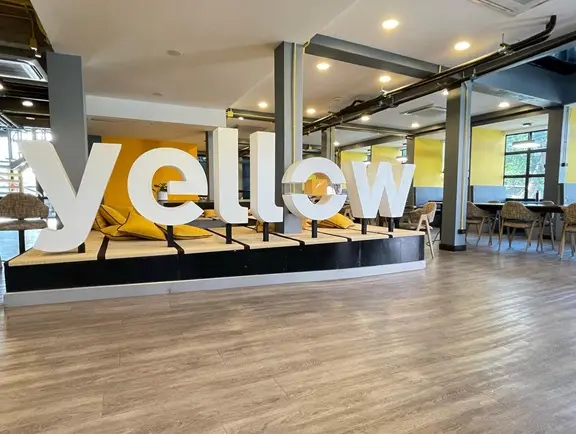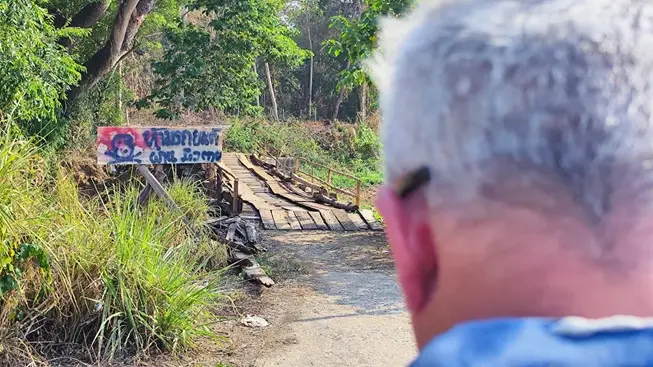Chiang Mai for Digital Nomads

Thailand has long been a favorite destination for digital nomads, offering a unique blend of affordable living, deep culture, and a rapidly expanding community of remote workers from all corners of the globe. Known for its friendly locals, rich traditions, and breathtaking landscapes, Thailand provides a dynamic environment for those who seek both adventure and productivity.
Personally, while I've been to Thailand dozens of times, it's never really called out to me. I've only been to beachy towns like Phuket, the Khos, and Bangkok too many times to mention. I've always loved the food, but never felt a strong pull towards it. However, Chiang Mai seems to buck the trend. It was recommended by a friend, and already seems like a good digital nomad destination that doesn't have to feel like a place full of hippies if you don't want it to be.
Unlike the other cities I've visited in Thailand, Chiang Mai immediately gave me a different vibe—more balanced, calm, and well-suited for those who want to work without feeling like they're perpetually on vacation. It merges the best of both worlds: a place where you can immerse yourself in local culture and also maintain a structured, productive lifestyle.
Among the many cities that attract digital nomads, Chiang Mai stands out as an exceptional hub. It not only offers an accessible coworking culture and a supportive community but also balances modern conveniences with an authentic Thai experience. The city’s relaxed atmosphere, diverse amenities, and cost-effective lifestyle make it particularly appealing to those looking to establish a long-term base.
I had previously dabbled in this whole digital nomad thing (a few days here and there), but I recently decided to try out the digital nomad lifestyle for a full two months. Packed my bag and decided to do a 3 country "market study" (Vietnam, Thailand, Malaysia).
This guide draws from firsthand experiences and practical insights to help those unfamiliar with South East Asia - and in this post specifically, for Chiang Mai - to help them navigate the unique aspects of living and working here as a digital nomad.
Why Choose Thailand as a Digital Nomad Destination?
Thailand is a top choice for digital nomads thanks to its unique mix of affordability, infrastructure, and laid back lifestyle. One of the biggest draws is the low cost of living, especially outside Bangkok. Compared to Western countries and even other Southeast Asian cities, Thailand offers affordable accommodation, food, transportation, and entertainment, allowing your budget to stretch further.
The digital nomad community is thriving, particularly in cities like Chiang Mai and Bangkok. Co-work spaces are well-equipped with fast internet, comfortable workstations, and easy access to reasonably good housing and public transport. Despite occasional political changes, including coups, the country has remained relatively stable over time, which is reassuring for business, and digital nomads.
Culturally, Thailand is rich and diverse. Whether exploring ancient temples, enjoying unique festivals, or delving into the modern art scene. It will be difficult to get bored here if you're only staying for a few months. And of course, it goes without saying Thai cuisine is a global favorite, known for bold flavors and fresh ingredients. Whether craving a $1 noodle dish or a gourmet meal, Thailand’s food culture is guaranteed to be consistently satisfying.
Chiang Mai: The Only Thai City I've Properly Tried to be a Digital Nomad

Full disclosure: I've never fully committed to the digital nomad experience in Thailand before. Sure, I've tried working remotely in places like Phuket and Bangkok, but it was always just for a couple of days and always from hotels and coffee shops rather than dedicated coworking spaces.
Even this trip to Chiang Mai was just a week-long stay, but it managed to give me a surprisingly comprehensive sense of what it's like to live and work here. Unlike my brief experiences in other Thai cities, Chiang Mai feels uniquely suited for balancing work and leisure.
One thing that stands out is how Chiang Mai seems to cater to a more serious remote working environment without losing its cultural charm. While Bangkok can feel overwhelming with its chaotic pace, and Phuket often feels like a never-ending holiday, Chiang Mai strikes a harmonious balance. You can find productive coworking spots, well-equipped cafes, and a sense of community that supports long-term stays. And I guess it helped a lot that it hasn't been raining, and it's not the very height of burning season.
Cost of Living in Chiang Mai
As mentioned, Chiang Mai was recommended to me by a friend who has lived here for about 2 years. He has a nice villa about an hour away from town. However, during my stay there I decided to live in the Nimmen area.
The cost of living here is significantly lower compared to Bangkok or the beach towns of southern Thailand, making it an attractive option for long-term stays.
| Category | Description | Typical Cost (THB/USD) |
|---|---|---|
| Accommodation | Budget apartments Mid-range Coliving |
150-240 USD 360-600 USD 240-450 USD (as it was only a week, I stayed in a hotel for about 20USD/night) |
| Food & Dining | Street food Mid-range meals International dining |
1 USD 3-7 USD 9-24 USD |
| Transportation | Scooter rentals Ride-hailing apps |
75-120 USD per month 1.50-3 USD per trip |
| Coworking & Internet | Monthly internet and coworking fees | Approx 90 USD |
| Leisure & Activities | Yoga session at a reasonably priced gym | Did one yoga session for about 15 USD (should be cheaper if you do multiple sessions) |
| Nightlife | Bars with drinks from 60-150 THB | 2-5 USD per drink |
If I'm being completely honest, I would admit that I would have spent more than I should have on nightlife, but I guess that's just par for the course.
Yellow Coworking

Put in minimal effort to finding a co-work space. I was staying in Nimman to found the co-work space closest to my hotel and I think might have just been very luck, but Yellow was one of the most reliable coworking spaces I’ve been able to work from (photo from Yellow Facebook Page)
The space itself is spacious and well-designed, with a bright, airy feel that helps you stay productive. The ergonomic chairs and large desks are a big plus, especially if you plan to work long hours. The internet speed is consistently fast, and I never had issues with video calls or uploading large files. Plus, there’s a casual, friendly atmosphere where people actually say hello and share tips about life in Chiang Mai.
Yellow also hosts community events regularly, ranging from networking nights to skill-sharing workshops. It should be a great way to meet like-minded individuals and find potential collaborators - admittedly, I wasn't able to participate as I was only there for a few days.
One downside, however, is that it can get quite crowded during peak hours, if you want a specific area or seat, arrive early.
Special Mention: Carrot Coffee CNX
If you’re exploring the Old Town area and need a cozy spot to get some work done, Carrot Coffee CNX is an excellent choice. The atmosphere is relaxed and not overly busy (at least not that afternoon I was there), making it an ideal space for a few hours of laptop time.
The coffee is smooth, and the Wi-Fi is surprisingly fast for a coffee shop. Plus, the staff are friendly and accommodating (no evil stares against someone who's ordering just one coffee and using their electricity).
While it doesn’t have the full amenities of a coworking space, it’s perfect for a change of pace or a few hours of focused work.
Visas and Legal Considerations

I've never had to apply for Thai visa, so most of this section is based off conversations with friends who live in Bangkok, a few who do visa runs from Chiang Mai, and some online information. Personally, I enter Thailand without a visa and can stay for up to 30 days.
One of the other more common choices is the Tourist Visa (60 + 30 days), which is ideal for short-term stays. You can apply for this visa at a Thai embassy or consulate before entering the country. Typically, you will need a passport valid for at least six months, passport photos, a completed visa application form, and proof of onward travel. The visa fee usually ranges from $40 to $60 USD, depending on your nationality.
Once in Thailand, you can extend your stay for an additional 30 days at the local immigration office in Chiang Mai, located near the airport. The extension fee is 1,900 THB (about $55 USD). It’s wise to prepare for long wait times at the immigration office and ensure you bring all necessary documents, including copies of your passport, visa stamp, and a passport-sized photo.
I've also been told that the Education Visa (ED Visa) is worth considering. This visa is typically valid for three months and can be extended for up to a year, depending on your chosen educational program. Many digital nomads choose to enroll in Thai language courses or other cultural studies. The total cost, including school fees and visa application, usually ranges from 20,000 to 30,000 THB ($600 to $900 USD) annually. The biggest advantage of this visa is the ability to stay legally in Thailand for an extended period without needing frequent visa runs.
Lastly, and this is all from online sources, so your research is as good as mine, Thailand introduced the Digital Nomad Visa (Long-Term Resident Visa), targeting professionals working for overseas companies, retirees, investors, and wealthy global citizens. This visa offers up to 10 years of residency, with the added benefit of multiple entries and, in some cases, a work permit. However, it comes with high financial requirements, such as proving an income of $80,000 USD per year for remote workers, and a visa fee of around 50,000 THB ($1,400 USD). While the application process can be complex, this visa provides a stable solution for those planning to base their business or remote work from Thailand long term.
If none of these options suit your needs, visa runs are still a common practice to extend your stay. Popular routes include Mae Sai, Myanmar (a quick day trip) and Vientiane, Laos (more suitable for obtaining a new 60-day tourist visa). Costs for visa runs vary from 2,000 to 5,000 THB ($60 to $150 USD), including transportation. Make sure to stay updated on border regulations, as rules can change without much notice.
Transportation and Mobility
The most popular mode of transport for digital nomads is renting a scooter, which is exactly what I did. Not only is it cost-effective, but it also offers the flexibility to navigate Chiang Mai’s narrow streets and memorable neighborhoods. Scooter rentals typically cost around 150 to 250 THB ($4.50 to $7.50 USD) per day or 2,500 to 4,000 THB ($75 to $120 USD) per month. There were many rental shops are located in the Nimman Area. Fuel costs are reasonable, averaging 35 to 40 THB per liter ($1 to $1.20 USD).
For those who prefer not to drive, ride-hailing apps are a reliable alternative. Grab is the most popular, known for its convenience and availability throughout the city. Fares range from 50 to 150 THB ($1.50 to $4.50 USD) for short rides.
I didn't even bother with public options like buses.
Leisure and Nightlife in Chiang Mai
The city is dotted with ancient temples, bustling night markets, and local artisan shops. One of the highlights is the Sunday Walking Street Market in the Old City, where you can browse handcrafted souvenirs, and sample local delicacies. There was even a fancy GoKart track!
Bars, Night Markets, and Street Food

Chiang Mai truly comes alive after dark, and exploring the night markets is an essential part of the experience. The Chiang Mai Night Bazaar is one of the most famous, featuring an array of stalls selling handmade goods, souvenirs, and, of course, mouth-watering street food. You can find everything from pad thai and grilled skewers to quirky souvenirs and Thai silk.
For a more local vibe, visit the Warorot Market near the Ping River. It’s a traditional market where locals shop for everything from fresh produce to textiles. In the evenings, the market transforms into a bustling food haven where you can try dishes like khao soi (a rich coconut curry noodle soup) and sai ua (spicy northern Thai sausage).
The Nimman area is particularly known for its trendy bars and craft beer spots which was one of the main reasons we chose to stay here. Lots of activitiy within walking distance from the hotel. Shelby Bar (pictured above) was particular busy, full of well heeled locals looking for a nice night out on town.
Final Thoughts and Recommendations

So in summary, Chiang Mai is an ideal destination for digital nomads, combining affordability, modern amenities, and a welcoming community. It blends traditional Thai culture with a modern vibe, offering a versatile lifestyle that suits both work and leisure.
The city’s cost-effectiveness is a major draw, with affordable accommodation, food, and coworking spaces. While the slower pace and beautiful surroundings make it a great place to stay, what will keep you staying is the convenience and variety of after hour activities.
Recommendations:
- Immerse in Local Culture: Explore beyond workspaces—visit temples, festivals, and try local cooking classes to feel more connected. There's more to life than just the office (or the cowork space).
- Choose the Right Area: Consider Nimman for modern conveniences or Old Town for a relaxed atmosphere. Monthly rentals are more economical.
- Build Your Network: Join community meetups and online groups to expand your connections. It really helped that I already knew a handful of people there.
- Plan for Long Stays: Research visa options like the Digital Nomad Visa (DTV) early to avoid issues.
- Embrace the Pace: Balance productivity with relaxation to make the most of Chiang Mai’s unique lifestyle.
Looking to Set Up Your Business in Thailand?
Well, we can't help you just yet... United Consulting mainly assists businesses in Vietnam, but we're actively building a network of Preferred Partnerships in South East Asia!
However, if you’re considering setting up your business in Vietnam, reach out to us today—we’ll guide you every step of the way!
Schedule a free consultation!
Disclaimer:
The information provided in this article is for general informational purposes only and does not constitute legal, tax, or investment advice. While every effort has been made to ensure accuracy at the time of publication, laws and regulations may change. Readers are encouraged to consult with qualified legal or financial advisors before making decisions related to foreign investment or share transfers in Vietnam. United Consulting is not liable for any actions taken based on this content.
I Live in Vietnam, but Played Digital Nomad for a Month. Here's a Digital Nomad Guide to Chiang Mai.